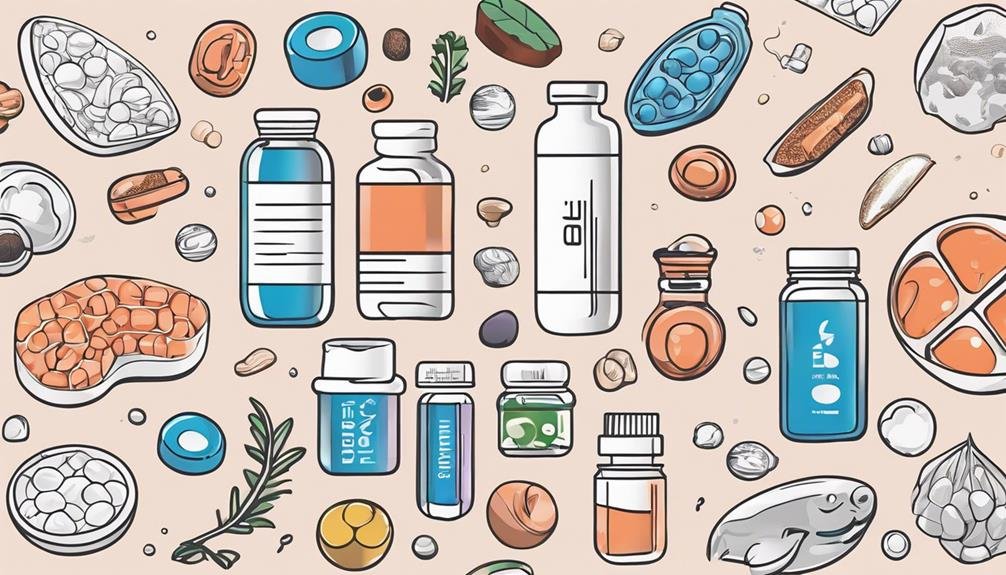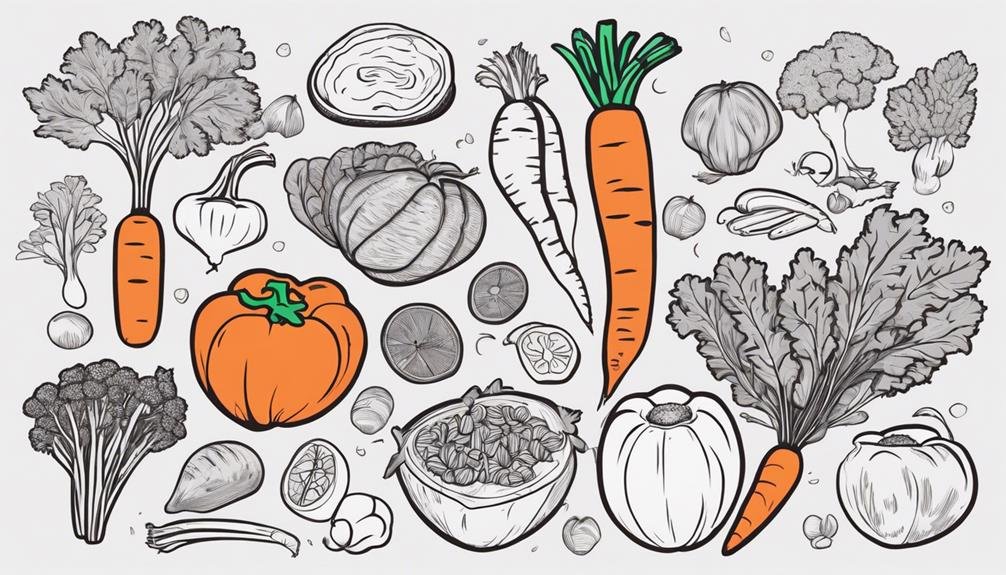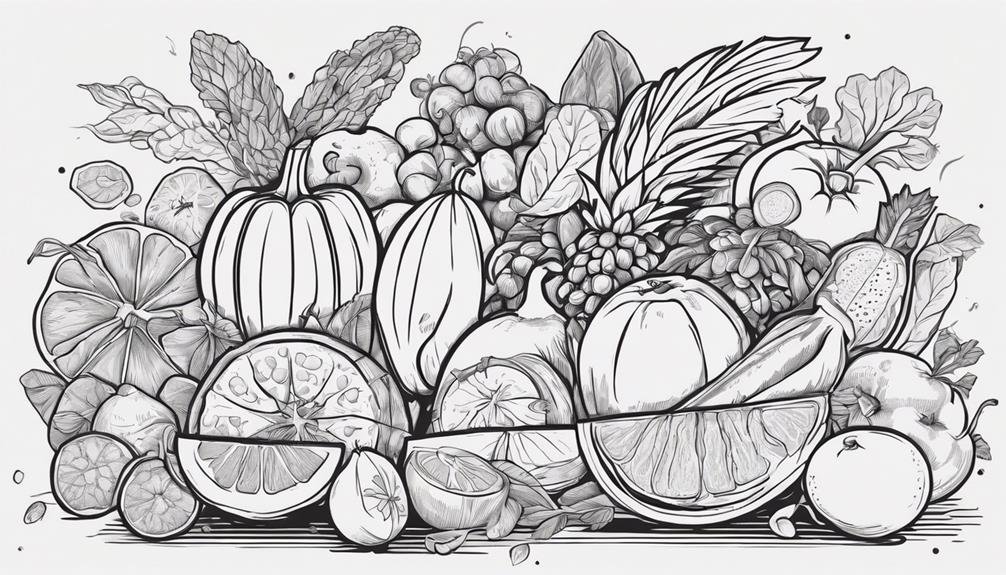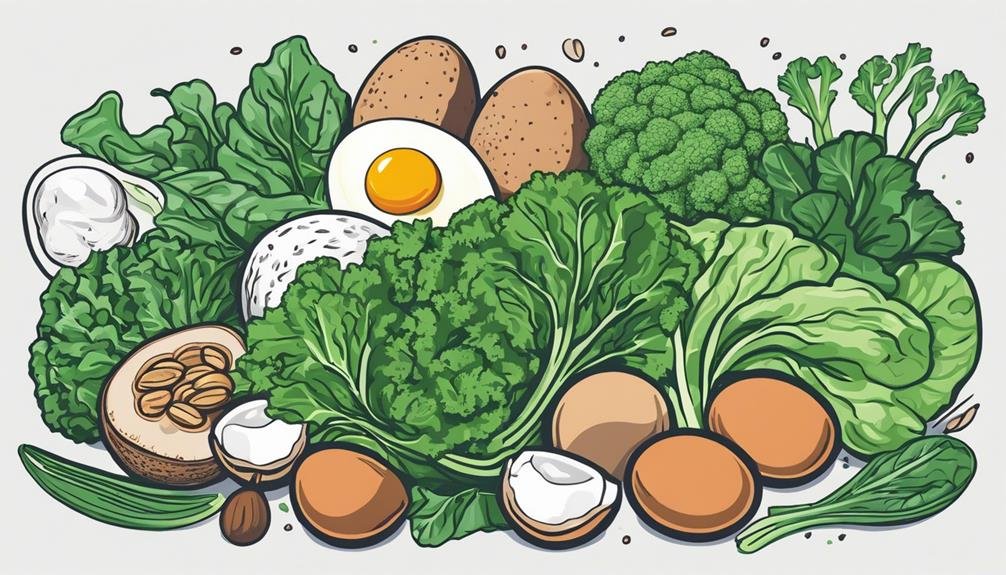As you consider the journey of aging, did you know that by the age of 50, your body might absorb nutrients less efficiently, making vitamin supplements crucial for maintaining overall health?
Exploring the realm of the 10 Best Vitamin Supplements for Healthy Aging can provide valuable insights into supporting your well-being as you navigate the process of growing older. From Vitamin D to CoQ10 and beyond, each supplement offers a unique contribution to promoting vitality and combating the effects of time.
Key Takeaways
- Vitamin D for bone strength and immune support.
- Vitamin C for skin health and antioxidant protection.
- Vitamin B12 for energy production and nerve function.
- Vitamin B9 for overall well-being and aging gracefully.
Vitamin D

Ensuring an adequate intake of Vitamin D is essential for maintaining optimal bone strength, muscle function, and overall well-being as you age. Vitamin D plays a crucial role in calcium absorption, which is vital for bone health. It also supports immune health by aiding in the regulation of the immune system. Research suggests that Vitamin D deficiency is associated with an increased risk of various diseases due to its impact on immune function.
To meet the daily recommended intake of Vitamin D, which is 600 IU before the age of 70 and 800 IU after, consider incorporating foods rich in Vitamin D into your diet, such as fatty fish, fortified dairy products, and egg yolks. Additionally, spending time in the sun can help your body naturally produce Vitamin D. If getting an adequate amount of Vitamin D through sunlight and diet is challenging, supplements can be a convenient way to ensure you meet your daily requirements for this essential vitamin.
Vitamin C
Maintaining optimal skin health and promoting overall immune function as you age can be supported by incorporating Vitamin C into your daily regimen. Here's why it's essential:
- Boosts Skin Health: Vitamin C acts as a potent antioxidant that stimulates collagen production, aiding in maintaining skin elasticity and firmness.
- Protects Against UV Damage: This vitamin helps protect the skin from harmful UV light damage, reducing the risk of premature aging signs such as wrinkles and fine lines.
- Supports Immune Function: Vitamin C plays a crucial role in enhancing overall immune function and is involved in the body's wound healing process.
Incorporating Vitamin C into your routine can improve skin texture, reduce hyperpigmentation, and support your body's natural defense mechanisms. By ensuring an adequate intake of Vitamin C, you not only enhance your skin's appearance but also bolster your immune system, contributing to healthy and vibrant aging.
Vitamin E

Vitamin E, a potent antioxidant essential for skin health and overall well-being, offers protection against UV rays and oxidative damage. This vitamin plays a crucial role in maintaining healthy skin by preventing premature aging and enhancing skin texture. Sources rich in Vitamin E include almonds, sunflower seeds, and spinach, which can easily be incorporated into your daily diet.
Adequate intake of Vitamin E not only supports skin health but also contributes to the maintenance of healthy hair and nails. Moreover, studies indicate that Vitamin E supplementation may help in reducing the risk of age-related macular degeneration, a condition that can impact vision as you age.
Vitamin B12
To continue supporting your overall well-being beyond skin health, let's now explore the importance of Vitamin B12 in maintaining essential bodily functions such as nerve function and red blood cell production. Vitamin B12 is crucial for your body's well-being, and here's why:
- Nerve Function: Vitamin B12 plays a key role in maintaining a healthy nervous system. It helps in the formation of the protective covering of nerves, known as the myelin sheath, ensuring proper nerve signaling and function.
- Red Blood Cell Production: Vitamin B12 is essential for the production of red blood cells. These cells carry oxygen throughout your body, providing energy for all your activities. Without enough Vitamin B12, you may experience fatigue and weakness due to decreased oxygen delivery.
- Deficiency Risks: Individuals at risk of Vitamin B12 deficiency include vegetarians, older adults, and those with gastrointestinal disorders. If you're in one of these categories, consider Vitamin B12 supplements to ensure you maintain optimal health and prevent potential deficiencies.
Vitamin A

Ensure your diet includes sufficient vitamin A to support healthy vision, immune function, and skin health. Vitamin A is crucial for maintaining optimal vision, as it's a key component of rhodopsin, a protein in the eyes that helps you see in low light.
Additionally, vitamin A plays a vital role in supporting your immune system, helping to fight off infections and keep you healthy. When it comes to skin health, vitamin A promotes cell growth and repair, contributing to a youthful appearance and overall skin integrity.
To ensure you're getting enough vitamin A, include foods like liver, carrots, sweet potatoes, and spinach in your diet. These foods are rich sources of this essential vitamin. However, be cautious with vitamin A supplements, as excessive intake can be harmful. It's important to follow recommended guidelines to prevent toxicity.
Vitamin K
Vitamin K is crucial for blood clotting and bone health.
Remember that there are two main forms of vitamin K found in different sources.
Make sure to include foods like green leafy vegetables and fermented foods in your diet to ensure you meet the daily recommended intake of vitamin K.
Benefits of Vitamin K
Beneficial for both your blood clotting and bone health, Vitamin K comes in two main forms: K1 (phylloquinone) and K2 (menaquinone).
Here are some key benefits of Vitamin K:
- Blood Clotting: Vitamin K is crucial for the production of clotting factors in your blood, which helps in wound healing and preventing excessive bleeding.
- Bone Health: Vitamin K aids in bone mineralization and supports bone density, reducing the risk of fractures and osteoporosis.
- Cardiovascular Health: By preventing calcium buildup in arteries, Vitamin K plays a role in maintaining heart health and reducing the risk of cardiovascular diseases.
Ensuring an adequate intake of Vitamin K through diet or supplements can contribute to your overall well-being and longevity.
Food Sources Rich
Rich sources of Vitamin K can be found in a variety of leafy green vegetables such as spinach, kale, and broccoli. These foods aren't only delicious but also crucial for your bone health. Vitamin K plays a vital role in bone metabolism, helping to maintain strong and healthy bones as you age.
In addition to the mentioned vegetables, other good sources of Vitamin K include Brussels sprouts, parsley, and fermented foods like sauerkraut. Ensuring an adequate intake of Vitamin K through these foods can contribute to your overall well-being, supporting cardiovascular health and bone density.
Make it a habit to incorporate these vitamin K-rich foods into your diet to help prevent deficiencies and promote optimal health as you grow older.
Daily Recommended Intake
To ensure optimal health and well-being as you age, it's important to be mindful of the daily recommended intake of Vitamin K. Here are some key points to consider:
- The daily recommended intake of Vitamin K is 90 micrograms for women and 120 micrograms for men.
- Vitamin K is crucial for bone health, as it helps in activating proteins essential for bone metabolism.
- Including green leafy vegetables like kale, spinach, and broccoli in your diet can provide you with an excellent source of Vitamin K to support your bone health.
Vitamin B6
Vitamin B6, also known as pyridoxine, plays a crucial role in brain development, metabolism, and immune function. This vitamin is vital for the production of neurotransmitters like serotonin and norepinephrine, which are essential for regulating mood and stress responses. Additionally, Vitamin B6 is involved in the synthesis of hemoglobin, the protein responsible for carrying oxygen in red blood cells throughout the body. Anemia, depression, confusion, and weakened immune function can result from a deficiency in Vitamin B6.
To ensure you're getting enough Vitamin B6, include foods like poultry, fish, bananas, chickpeas, and fortified cereals in your diet. These sources can help you meet your daily requirements and support overall health. However, if you struggle to obtain enough through your diet alone, consider speaking with a healthcare provider about potential supplementation. Remember, maintaining adequate levels of Vitamin B6 is crucial for your body's functions and overall well-being.
Vitamin B9

For optimal health and well-being, ensuring an adequate intake of Vitamin B9, also known as folic acid or folate, is crucial. Vitamin B9 plays a vital role in DNA synthesis, supporting cell division and growth, making it essential for overall health.
Here are three key points about Vitamin B9:
- DNA Synthesis: Vitamin B9 is crucial for DNA synthesis and repair. It aids in the production of genetic material, supporting proper cell growth and division.
- Anemia Prevention: Vitamin B9 is essential for red blood cell formation, helping to prevent anemia. An adequate intake of Vitamin B9 ensures proper oxygen transport in the body, supporting energy levels and overall well-being.
- Neural Tube Defect Prevention: Adequate Vitamin B9 intake is particularly important for pregnant women as it helps prevent neural tube defects in developing fetuses. Ensuring sufficient levels of Vitamin B9 supports brain health and development in both mother and child.
Vitamin B3
Ensuring an adequate intake of Vitamin B3, also known as niacin, is essential for supporting energy conversion from food and maintaining proper nerve function. Niacin plays a crucial role in lowering cholesterol levels, reducing cardiovascular risks, and supporting a healthy metabolism.
Beyond these benefits, vitamin B3 is also vital for maintaining healthy skin, improving circulation, and supporting overall brain health. If you find yourself experiencing symptoms like fatigue, digestive issues, skin problems, or cognitive impairments, a deficiency in Vitamin B3 could be a contributing factor.
To boost your intake of Vitamin B3, consider incorporating foods like meat, fish, dairy products, nuts, and whole grains into your diet. However, supplementation may be necessary for some individuals to meet their daily requirements effectively.
Vitamin B7

Biotin, or Vitamin B7, is essential for converting food into energy and promoting healthy hair, skin, and nails. Sources of biotin include eggs, nuts, seeds, and leafy greens.
Ensuring you meet the daily recommended intake of biotin can support overall well-being and vitality.
Benefits of Biotin
With its essential role in maintaining healthy hair, skin, and nails, Biotin, also known as Vitamin B7, is a crucial nutrient for overall well-being and aging gracefully. Biotin offers numerous benefits that can help you look and feel your best as you age:
- Promotes Hair Health: Biotin is known to strengthen hair strands, reduce hair loss, and promote hair growth, giving you thicker and healthier-looking hair.
- Enhances Nail Strength: By supporting keratin production, biotin improves nail health, reducing brittleness and preventing breakage.
- Supports Skin Radiance: Biotin aids in the maintenance of healthy skin by promoting the production of fatty acids essential for skin health, leading to a more vibrant and youthful complexion.
Incorporating biotin into your daily routine can contribute to a healthier and more vibrant aging process.
Food Sources
To maintain optimal levels of Vitamin B7 in your body for healthy aging, it's essential to be mindful of incorporating biotin-rich foods into your daily diet. Vitamin B7, also known as biotin, can be found in various foods such as eggs, nuts, seeds, and leafy greens. Biotin is vital for metabolism, cell growth, and the production of fatty acids.
Ensuring an adequate intake of biotin is crucial for promoting healthy hair, skin, and nails. While some individuals may consider biotin supplements, including biotin-rich foods in your diet is a natural and effective way to support overall health and well-being.
Daily Recommended Intake
For healthy aging and overall well-being, ensuring you meet the daily recommended intake of Vitamin B7 is essential to support optimal hair, skin, and nail health. Here's what you need to know about Vitamin B7 daily intake:
- The daily recommended intake of Vitamin B7, also known as biotin, is 30 mcg for adults to maintain healthy hair, skin, and nails.
- Pregnant or breastfeeding women may need around 35 mcg of Vitamin B7 to support fetal development and overall health.
- Vitamin B7 deficiency is rare but can lead to symptoms like hair loss, skin rash, and brittle nails, highlighting the importance of meeting daily intake recommendations.
Remember to include foods rich in biotin, such as eggs, nuts, seeds, and certain vegetables, to meet your daily Vitamin B7 requirements.
Frequently Asked Questions
Which Vitamin Is Best for Anti-Aging?
For skin rejuvenation, collagen production, and wrinkle reduction, Vitamin C, a potent antioxidant, is your go-to. Boosting skin health and UV protection, it's a powerhouse for anti-aging benefits. Make it a staple in your routine!
What Vitamins Should I Be Taking for My Age?
You should aim for a balanced nutrition plan to support your age-related needs. Consider the benefits of various vitamins like Vitamin D for bone health, Vitamin C for skin vitality, and B vitamins for energy. Monitor your daily intake wisely.
Which Supplement Is Best for Old Age?
When looking for the best supplement for old age, Coenzyme Q10 stands out for reducing signs of aging and improving overall health. It's great for skin elasticity, wrinkles, and your general well-being.
What Is the Best Anti-Aging Supplement Brand?
When choosing anti-aging supplement brands, consider top brands backed by clinical studies and positive user reviews. Look for certifications from reputable organizations for quality assurance. Your decision should be informed by evidence and real experiences.
Conclusion
In conclusion, incorporating these top 10 vitamin supplements into your daily routine is like building a strong fortress to protect your body from the ravages of time.
Just as a skilled craftsman carefully selects the best materials to construct a sturdy castle, you can fortify your health with these essential nutrients to support healthy aging and overall well-being.
Stay strong, stay vibrant, and age gracefully with the power of vitamins on your side.
